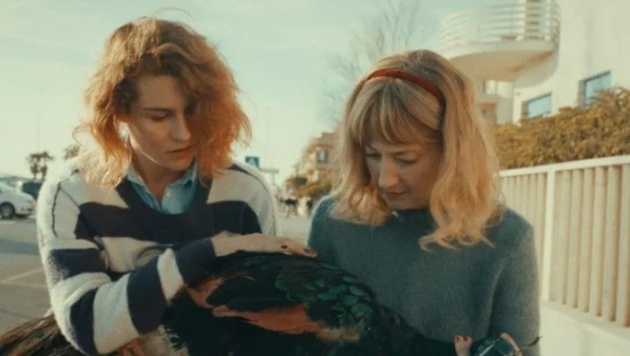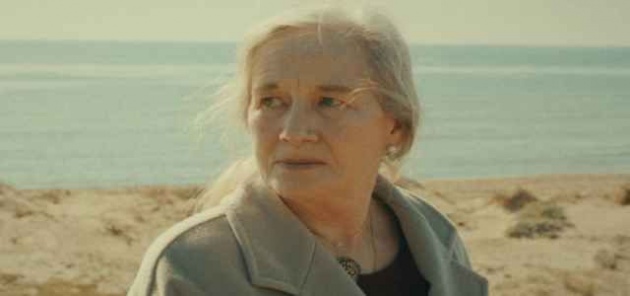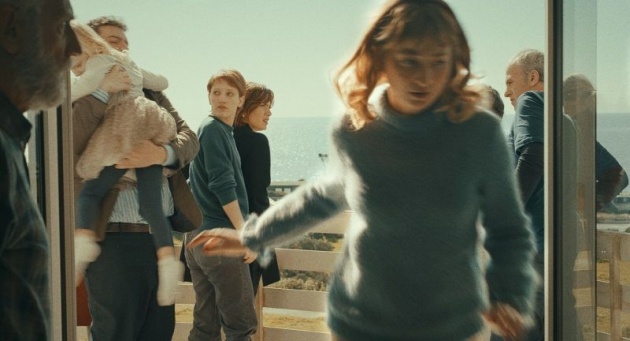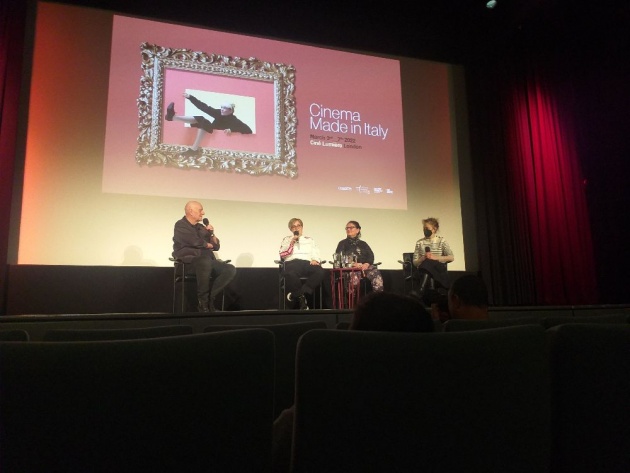
Pictured: A bird in the hand is worth a weighty movie metaphor. Joana (Tihana Lazovic, left) and Adelina (Alba Rohrwacher, right) in a scene from 'Il Paradiso del Pavone' (Peacock's Paradise) an Italian film co-written and directed by Laura Bispuri. Still courtesy of Vivo Films (Italy) / Rai cinema (Italy)
Do film directors have an obligation to tell stories in an expansive, dramatic way? Not always. Relationships are messy, complicated and often unresolved. Italian co-writer-director Laura Bispuri’s third feature, Il Paradiso del Pavone (Peacock’s Paradise) explores this in an engaging way, with two gasp-making moments. The heavy metaphor in its title – reflecting one of the character’s pets – gives the film a distinctive edge. You may not remember the title, but you’ll recall the film as ‘the one with a peacock in it’, which is, as far as I know, not an episode of Friends.
A peacock, otherwise known as ‘pavo’ or ‘Afropavo’ (thank you, National Geographic) is the male of the species – its female counterpart is known as a peahen. Collectively, they are known as peafowl. Their feathers form a train that makes up sixty-per cent of their body weight. Blue peacocks – the variety featured in the film – are typically found in India and Sri Lanka. When they want to impress a peahen in their mating ritual, they spread their feathers in a magnificent fan - nature’s eye-catching special effect. You would worry if a peacock spread its feathers in an indoor setting, away from other birds, shattering a vase, as happens here. You would worry too if the peacock were consigned to the outdoor balcony. It has a great view of the sea – the film is set in the coastal region of Ostia, near Rome. The peacock also has sight of a passing white dove.
When we describe a person as a peacock, we refer to their strutting, ostentatious arrogance, their assumption of superiority. Only one of the three male characters in a female-heavy cast of eleven, Manfredi (Fabrizio Ferracane) fits this description. He is the estranged husband of Caterina (Maya Sansa, soon to be seen in Alice Winocour’s new film, Revoir Paris alongside Virginie Efira), who inveigles himself into Caterina’s mother’s birthday party, leaving his girlfriend, Joana (Tihana Lazovic) in the car. Joana says she doesn’t mind, but posters featuring a missing young woman creep her out. After a while, she moves the car a few yards down the street, so a key event happens behind her.
Manfredi was asked to give Caterina a lift; her car had broken down. It isn’t clear why he obliged with Joana in tow, but he promised her a walk on the beach, and a walk they shall have - and they do. He wants to see Nena (Dominique Sanda), whose birthday is being celebrated. He hasn’t seen her in a while. ‘I told her you were busy with your work,’ Caterina explains as they climb the stairs. ‘I like that version of myself,’ replies Manfredi; Bispuri and her co-screenwriter Silvana Tamma write telling dialogue.
We first meet Nena as she travels in her car, adjusting her seatbelt. Almost the entire cast of eleven characters, plus one peacock, are introduced in their cars. The first shot of the film, which shows a series of passing palm trees as seen through a car window sets the tone. We don’t see the bottoms of these trees – their stumps or roots are not visible. When we meet each set of characters we are similarly disorientated. It is not immediately clear that we are looking at three separate cars; Bispuri doesn’t cut to their exterior. So we spend some time working out who is in each car. For the purpose of clarification, Nena is alone in her car, Nena’s son Vito (Leonardo Lidi), his girlfriend Adelina (Alba Rohrwacher), their daughter Alma (Carolina Michelangeli) and their (unnamed) pet peacock travel in the second car while Joana, Manfredi and Caterina travel in the third car. The peacock, you will be relieved to know, has plenty of room. When Adelina opens the top window of Vito’s car, we worry – won’t the peacock fly out? Adelina peeps out through the top, allowing the breeze to ruffle her hair.

Pictured: Nena (Dominique Sanda) in a scene from the Italian family drama, 'Il Paradiso Del Pavone', co-written and directed by Laura Bispuri. Still courtesy of Vivo Films (Italy) / Rai Cinema (Italy)
Nena arrives first and Bispuri shows her taking off and hanging up her coat. This piece of action doesn’t tell us much about her; it seems almost superfluous. But it is a gesture that prefigures the putting on of outdoor attire at the end of the film, when the family are in a sombre mood. The gesture only belatedly acquires meaning.
In the lull before the afternoon meal, Nena walks to the window. She asks Lucia (Maddelena Crippa) a woman her age sitting inside whether she is still desirable. ‘Of course,’ replies Lucia, kissing Nena full on the lips. I wondered whether they might be sisters or cousins. Lucia dyes her hair, whereas Nena does not. Interestingly – and this says something about her domestic set up – Nena does not pose the question to her husband, Umberto (Carlo Cerciello, in an underwritten role that requires him to be the kindly grandfather). Umberto does not lead the celebrations for his wife’s birthday.
The tenth character is Grazia (Ludavica Alvazzi Del Frate), the mute helper. I could not make out what relation she was to Nena, Umberto and Lucia – an unwed niece perhaps. Grazia’s role in the film is to provide comfort to others. She is also a silent observer – a surrogate for the audience. Bispuri’s portrayal of disability is not progressive, which accounts for some of the hostility towards the film. Nevertheless, Grazia has two important moments. In the first, she hugs Isabella (Yle Viamello) to prevent her from interrupting two characters in the throes of passion. In the second – representing Bispuri’s worst impulse – she speaks one line: ‘it could have been us.’ Since no one is surprised when Grazia speaks – we recognise the trope from Silent Bob in Kevin Smith’s Clerks films, so we aren’t surprised either – perhaps she says the words in her head and the scene is non-naturalistic. In one other scene, Grazia is asked if she has a boyfriend. In the final scene of the film, she appears to find one, as she points to a piece of cake to the man behind the counter. For his part, he brings her the cake without saying anything.
Isabella arrives way after the others; some of the family don’t know who she is. Nena gets very agitated. Isabella must have a chair at the table, part of a matching set. However, Lucia won’t give it up. She is seated away from the family, in the kitchen. Nena doesn’t force the issue, but the sense of tension is there. We deduce that she wants to be seen as part of the family. In the kitchen, she is the equivalent of the non-visible tree stump.
Vito, Adelina, Alma and the peacock arrive, bringing a sense of chaos and delight. Alma is admired; she has grown. The peacock causes consternation; Vito’s family hasn’t heard the speechwriting aphorism, ‘three calms, four alarms.’ Early on, Alma loses a tooth. Adelina whisks it away. It is destined for the ‘little mouse’, their family’s equivalent of a tooth fairy. Nema mentions the tooth fairy; Alma is confused. She hasn’t heard of the mythological being who exchanges children’s teeth for coins or time on the Play Station (each to their own). The tooth won’t be taken by a ghost either. Alma could conclude that there is a lot of interest in lost teeth; no wonder most people want to keep them in their mouths.
Adelina is keen to be liked by Nena and displays the nervousness of an outsider. She brings Nena a bottle of Franciacorta wine, emphasizing (twice) that it is Franciacorta. Nena doesn’t acknowledge the gift. Adelina has also knitted her a pullover, but it isn’t Nena’s favourite colour. Vito and Adelina run a bar together. They confide in Caterina that they intend to get married. But they need a loan. ‘Less than you’d think,’ says Adelina, ‘five thousand [Euro].’ ‘Whenever we talk, it’s always about money,’ replies Caterina. ‘We’d pay you back and, of course, we wouldn’t expect a gift.’ Rohrwacher, the sister of film director Alice Rohrwacher, is skilled at playing slightly flaky, frivolous, socially awkward women. Adelina is more of a child than her daughter and is vulnerable to criticism. At one point, she reveals the birthmark on her back to explain how she embraces looking different. She has also recently recovered from a long illness.
Caterina is a fairly gloomy figure, unhappy that her estranged husband is sticking around. For his part, Manfredi watches her smoking a cigarette and starts talking about the ‘God between his legs’. He lusts after her unquestionably. However, he is surprised that young Alma is watching him. Later, young Alma quotes his line about ‘the God between his legs’. Vito is embarrassed and tries to explain it as a poem. Later, Manfredi confronts Caterina. ‘Your car isn’t broken. I saw it behind the house,’ he declares. They share an intense look and then a kiss. Manfredi takes his God for a walk.
Before lunch really gets started, the peacock takes an interest in the painting of a dove and spreads his feathers. It is a spectacular moment, but an alarming one – pottery is broken. Nena is severe. ‘Do you think the peacock should be in the house?’ she asks Alma. Alma is apprehensive. Nena continues. ‘Don’t you think the peacock is better off outside?’ Alma finds herself staring at the peacock through glass. ‘It won’t be for long,’ the child whispers
Lunch is super-awkward – Lucia does not yield her chair. Caterina makes a toast. When Vito is asked to do so, he falters. Adelina deflects attention by asking Alma to sing. The child does so. Halfway through Alma’s performance, Bispuri cuts the sound. We see her admired by the family, who are rapt in attention, not noticing what is happening on the balcony as the peacock takes an interest in an actual dove. Peacocks can fly – but not very far.

Pictured: Panic on the balcony. Adelina (Alba Rohrwacher) dashes to attend to a family tragedy in a scene from co-writer-director Laura Bispuri's film, 'Il Paradiso Del Pavone' (Peacock's Paradise). Still courtesy of Vivo Films (Italy) / Rai Cinema (Italy)
What follows is chaos and a series of scenes in which feelings are shared. A vet is mentioned but never arrives. Finally, one member of the family decides to leave. Then they all do.
By the end of the film, understandings are reached. Joana joins the family and announces that she is pregnant with a boy, Sasha. Who is Sasha named after? ‘Just Sasha.’ Nena’s sexuality is acknowledged. She loves her husband. ‘He never made me choose.’ There is a walk on the beach and a snack afterwards in which the way characters eat tells us something about them.
Quite apart from the treatment of the mute character, the film has grated with some reviewers, who frankly didn’t notice the leaves from the branches. Bispuri’s use of close-ups and editing in the second half of the film yields dramatic results. Suddenly the sea shows signs of life – a group of synchronised swimmers in training. I confess to being totally involved in the drama from the moment the peacock spread its feathers, drawn into the present tense of it. Nena emerges as a more complicated character. ‘Do you blame me,’ she asks Alma after the balcony incident. Alma, who we suspect is still terrified of her grandmother, shakes her head.
Peacock’s Paradise has one big dramatic moment plus a series of revelations. It does not tie everything up neatly. We’re not even sure if Vito and Adelina will marry. However, the family has a better understanding of who Nena is, so at least one person is happy.
Reviewed at ‘Made in Italy’, Cine Lumiere, South Kensington, London, Saturday 5 March 2022, 18:20, followed by a question-and-answer session with Laura Bispuri and Alba Rohrwacher

Pictured: Alan Jones (left) interviews Laura Bispuri (2nd left) and Alba Rohrwacher (masked, right) at the Cine Lumiere in London after a screening of 'Il Paradiso del Pavone'. Photo: Larry Oliver



